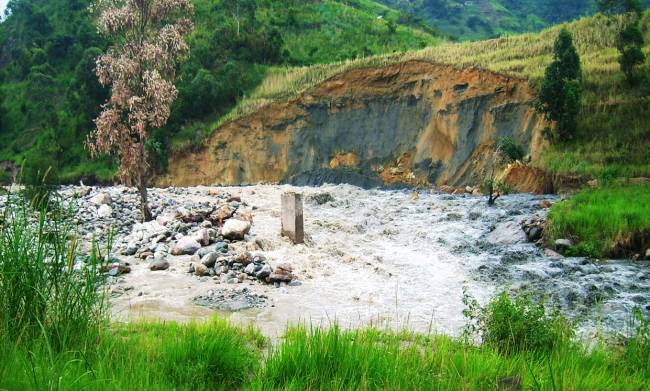Whereas River Nyamwamba in Western Uganda is well known for the destruction of property and loss of life whenever it overflows, the environmental effects are less known and could be more lethal
The mining and processing of copper in Kilembe, Western Uganda, from 1956 to 1982 left over 15Metric Tonnes of tailings containing cupriferous and cobaltiferous pyrite dumped within a mountain river valley. In addition, underground Kilembe mine water is pumped to the land surface or allowed to flow by gravity into surrounding agricultural soils and water bodies. The study was conducted in Kilembe mine, Kasese district to assess the impact of Kilembe mine and the wastes (tailings) on soil quality, water quality, foods frown, forage and local people exposure. The samples collected included soil, water, foods, forage, sediments and toe nails from local volunteers.
Sample analysis was conducted from the school of biosciences, Nottingham University, UK. The study found high levels of metal concentration especially copper, cobalt, nickel, zinc, arsenic and lead in agricultural soils, public water sources, house dusts and sediments in water. Aluminium and Iron metals were more abundant in public water sources. The metals were not only originating from mine tailings but also underground Kilembe mine water. The leachate water at Kilembe mine also contain large amounts of metals especially copper, iron and aluminium.
The foods and forage grown contained significantly higher concentrations of copper, cobalt, zinc, possibly taken up during growth and accumulated in the foods which could lead to consumption of the same elements by local people. Indeed, tests on human toe nails from Kilembe area volunteers confirmed that local people were more exposed to the mine metals especially copper, cobalt and nickel. Children were more exposed than adults.
It is on this note that the following policy recommendations are made;
1. There is need for enforcement of proper waste storage and disposal protocols
2. Local people living in contaminated environments should be sensitized on the dangers so that they make informed decisions
3. There is need for construction of a containment all around Kilembe tailing sites and land filling with soil so as to prevent erosion of tailings into agricultural soils and water
4. There is urgent need to treat Kilembe mine underground water before it is discharged into River Nyamwamba
5. There is need to implement remediation activities for soils along River Nyamwamba and below tailings
Summary of findings
Water quality
Over 25 % of domestic water samples collected and 40% of River Nyamwamba waters along the mine area and downstream exhibited Cobalt concentrations exceeding the Wisconsin (USA) drinking water thresholds of 40 μgL-1. Almost all water samples upstream of River Nyamwamba exceeded UK recommended Iron and Aluminium concentrations in drinking water. Most domestic water samples (67%) exceeded recommended drinking water thresholds for Aluminium, Iron and Cobalt.
Forage
Elevated concentrations of Iron, Cobalt, Copper, Zinc and Lead were found in forage grasses collected along the mine area and downstream. The high levels of metal in forage could affect the health of animals and will also be reflected in the milk and beef produced in Kilembe area exposing consumers to metals.
Human exposure
Trace elements concentrations (mg kg-1 dw) were found in toe nails of 15 adults and 12 children from the Kilembe copper mining district in Western Uganda. Control samples were from 5 children aged 9-14 years and 5 adults aged 20-60years. The toe nails clearly confirmed exposure of the local people with children being more exposed and affected than adults.
Please see Downloads for full policy brief.
A Documentary on the same can also be accessed at the YouTube link: https://youtu.be/gp1Bpk4LPmU
Article by Abraham R. Mwesigye (PhD), School of Forestry, Environmental and Geographical Sciences, Makerere University, Email: mwesigye[at]caes.mak.ac.ug


 General2 weeks ago
General2 weeks ago
 Natural Sciences2 weeks ago
Natural Sciences2 weeks ago
 Agriculture & Environment1 week ago
Agriculture & Environment1 week ago
 General6 days ago
General6 days ago
 Health2 weeks ago
Health2 weeks ago


